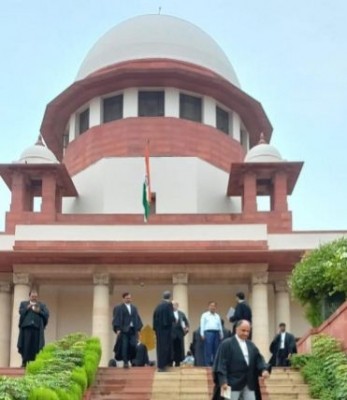
New Delhi, The Supreme Court on Monday shot a volley of questions at petitioners' counsel challenging the ban on wearing of hijab in government colleges in Karnataka, wondering whether a student's choice of wearing minis to the classroom would be justified, and highlighted that a dress code is applicable on a golf course, restaurant, and courtroom.
A bench of Justices Hemant Gupta and Sudhanshu Dhulia said wearing hijab might be a religious practice, but the question is can one take hijab to a school where a uniform is prescribed? The bench orally observed Karnataka's government's order allowing college development committees to prescribe uniforms did not appear to violate the right to education.
Justice Gupta queried senior advocate Sanjay Hedge, representing one of the petitioners, if the absence of a prescription of a dress code would enable the students to wear anything to the classroom. "Can students come in minis... whatever they want when there is no prescription, would the executive power of state come in?"
"You are saying Act (Karnataka Education Act) doesn't prescribe dress code and does not debar prescription either. Does it exclude the state then?"
"You may have a religious right.... can you take that right within an educational institution where a uniform is prescribed. You may be entitled to wear the hijab or scarf; can you carry the right within an educational institution (where a uniform has been prescribed)."
At the beginning of the hearing, senior advocate Rajeev Dhavan, representing one of the petitioners, submitted the case raises an important question, whether hijab is essential to Islam or not. He said hijab is worn in a large number of countries throughout the world and the case involves a constitutional question which has not been dealt with earlier.
The Karnataka government, led by Advocate General Prabhuling K. Navadgi submitted that "we have left it to the institution concerned. The government purposefully left it to the college development council." He added that to his knowledge, at least two colleges in Udupi allowed Hijab.
Additional Solicitor General K.M. Nataraj, also representing Karnataka, submitted discipline in colleges was only the issue, but petitioners were unnecessarily expanding it and some under the guise of religious practices wanted to violate it.
Hedge tried to link wearing of hijab with modesty and dignity of girls, and added that most girls' colleges prescribe salwar kameez and dupatta. He argued further, can one ask women not to wear a chunni on head, for example in Patiala? Can one control the modesty of a woman?
The bench said even courtrooms have a dress code, for example could a woman wear jeans to the courtroom saying it's her choice, there is a dress code on a golf course, which is a public space, and also certain restaurants have a dress code and they do not allow people in shorts. "Can a person say I won't follow dress code but still have access?" it asked.
Hedge said the golf course is private property. The bench replied that this is not always the case.
Hedge argued that under the rule making power of the Karnataka Education Act, the executive cannot violate the fundamental rights. The bench noted that the government is not denying the right to education, but they are saying that you have to come in uniform. The bench has scheduled the matter for further hearing on Wednesday at 2 pm.
The top court was hearing a clutch of petitions against the Karnataka High Court judgment, which upheld the right of educational institutions to ban wearing of hijab in pre-university colleges in the state.


.jpeg)

